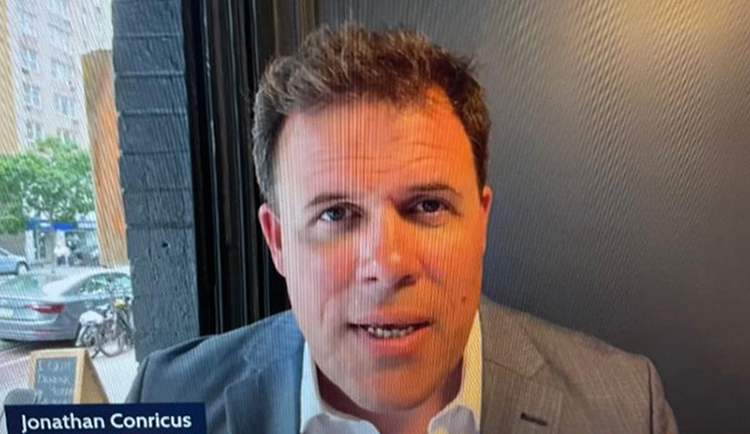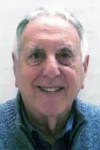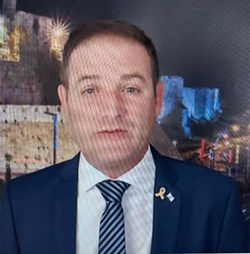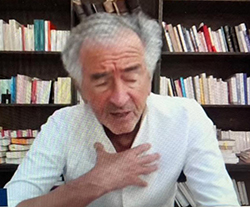
By Donald H. Harrison

SAN DIEGO – The murder of six Israeli hostages, including Israeli-American Hersh Polin-Goldberg, has prompted the Israel Defense Forces to avoid maneuvering in areas of Gaza where they think hostages are being held in order to prevent Hamas from carrying out similar executions.

That assessment was made by Jonathan Conricus, former spokesman for the IDF in a webcast interview Sunday with Michael Dickson, the StandWithUs Israel executive director, who spoke with him from Jerusalem.
“What we are seeing on the ground is continued IDF activity, but what I’ve heard and seen is that the IDF is very, very, extremely careful not to operate in areas where it thinks that there might be hostages in order not to trigger a similar event unknowingly whereby Israeli troops will be maneuvering in an area and then Hamas will execute them out of fear of Israelis being close in order to rescue them,” Conricus said.
Conricus, in New York City to begin a speaking tour for StandWithUs, said that the mass Israeli protests before and after the murders to demand the release of the hostages encourages Hamas to prolong the Gaza War and to hope for advantages in the indirect ceasefire negotiations with Israel.
“Hamas is really looking at what is happening in Israel – the public outcry, the protests, and the political turmoil — and really benefitting from all of it, and I think strengthening their bargaining position,” said Conricus, a lieutenant colonel in the IDF reserves. “They are seeing the very genuine, authentic outpouring of support for the hostage families in Israel, and they are translating it to political gain and advantage in the negotiations.”
“What we are not seeing is significant pressure applied on Hamas, neither through Qatar, neither through the Egyptians or Turkey,” Conricus added. “They are basically being allowed to continue to hold Israeli hostages and they are not paying a price for it.”
Asked about the significance of the Philadelphi corridor, which runs along Gaza’s border with Egypt, Conricus responded that “the most important thing is what happens underground and what I find missing from Israeli communications and the press briefing that the prime minister (Benjamin Netanyahu) gave was the actual plan to stop the tunnels because it is not enough to control the border itself above ground. But what Israel needs to do, in my mind, is a serious engineering effort and basically to make it impossible for Hamas to dig any more tunnels and [not] to use the ones that already exist. That as far as I know isn’t in the making yet and that needs to happen and that will apply a lot of pressure …”
Turning to the situation at Israel’s border with Lebanon, Conricus said that “every day that goes by and there is no diplomatic urgency to deescalate the situation, push Hezbollah away from the border and allow 70,000 Israelis to return safely to their homes without the fear of an Oct. 7th style [attack] against them … brings us one day closer to an all-out escalation which would be difficult for Israel, devastating for Lebanon, and could be really dangerous for the region.”
Meanwhile in Judea and Samaria, also known as the West Bank, IDF’s “long overdue operation” to attack the infrastructure of various Palestinian terrorist organizations, is “dealing with an imminent live threat of the use of vehicle bombs,” Conricus said. “We’ve seen five of them in the last three weeks dispatched toward Israeli targets. Fortunately, they haven’t been successful.”
“Here, just like we discussed with Philadelphi and Gaza, we have to address the root cause – the thing that allows Palestinian terror organizations to keep on … killing Israelis and threatening to kill Israelis is the fact that we don’t have a good control over the Israeli-Jordanian border …. Weapons are getting in. The Iranians are smuggling these weapons from Syria into Jordan and into … specifically Samaria … and that is really the fuel behind these attacks.”

The webcast also included a conversation with Bernard-Henri Lévy, a French philosopher and commentator on international affairs, whose most recent book Israel Alone includes rebuttals to the Left’s most frequent charges against Israel including racism, apartheid, and genocide.
Immediately after Oct. 7, he flew to Israel and visited two of the hardest hit areas of the massacre: Kibbutz Be’eri and Kfar Aza. “The corpses had been already removed but there were still pieces of bodies here and there,” he said from Paris. “There were still some light fights inside the Kibbutz of Kfar Aza. … For me, it is an unforgettable experience, to arrive in those Ghost Kibbutzim … to see those who escaped and to feel the presence of those who died.”
He said he was surprised that in Europe and America, in the aftermath of the attack, there was a “wave of joy” in which some renowned professors said this was a great day in their life. “You had demonstrations in the streets of New York saying that Oct. 7th was a fair reply to a long Israeli occupation.”
He used the term “radical evil” to describe the actions of participants in the Oct. 7th massacre and its aftermath. “Generally, human beings commit evil with a name, with a target. They want territory, they want political victory … there is a target, there is an objective. In that case, it was evil for [the sake of] evil. To rape ladies in such a way, to take hostages like preys in antiquity … to treat hostages like they were treated, like beasts, the few images that we have … There is not any agenda.” He described the massacre as “pure cruelty, pure will to kill and to kill in the most vile way, pure will of humiliating, killing, torturing Jews because they are Jews.”
Dickson asked Lévy why he thought some people in America and Europe would greet such “radical evil” with joy.
Antisemitism has existed for millennia, Lévy responded, but “the recent events against Jews, Jew-hate, really filled the air. … You saw that at the U.N. The first reaction of the U.N. at all levels, from top to toes, from the General Secretary Guterres, to the UNRWA … excusing the butchers and the killers … The first reflex of the U.N. without thinking was to accuse the Jews, it was to say that it was well-deserved. In America, the first reflex of so many people was to say that the Nova party was a provocation – how can you organize a party, a feast, a dancing party … so close to the border of Gaza?”
Lévy complimented those students and Jewish community members who stood firmly with Israel, without apology. “That warmed my heart,” he said.
*
Donald H. Harrison is publisher and editor of San Diego Jewish World.